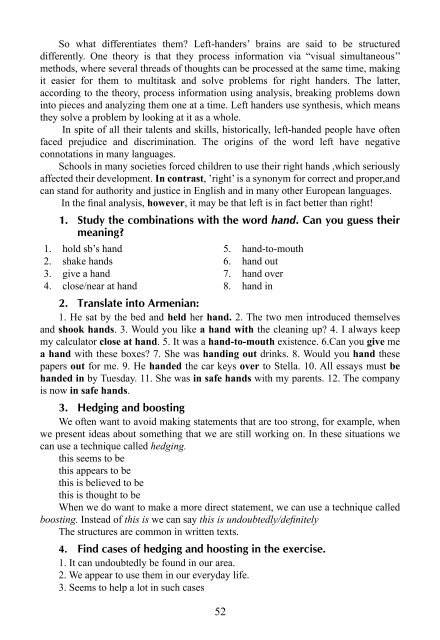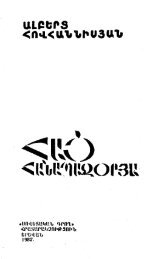Focus on Words
Focus on Words
Focus on Words
Create successful ePaper yourself
Turn your PDF publications into a flip-book with our unique Google optimized e-Paper software.
So what differentiates them? Left-handers’ brains are said to be structured<br />
differently. One theory is that they process informati<strong>on</strong> via “visual simultaneous’’<br />
methods, where several threads of thoughts can be processed at the same time, making<br />
it easier for them to multitask and solve problems for right handers. The latter,<br />
according to the theory, process informati<strong>on</strong> using analysis, breaking problems down<br />
into pieces and analyzing them <strong>on</strong>e at a time. Left handers use synthesis, which means<br />
they solve a problem by looking at it as a whole.<br />
In spite of all their talents and skills, historically, left-handed people have often<br />
faced prejudice and discriminati<strong>on</strong>. The origins of the word left have negative<br />
c<strong>on</strong>notati<strong>on</strong>s in many languages.<br />
Schools in many societies forced children to use their right hands ,which seriously<br />
affected their development. In c<strong>on</strong>trast, ’right’ is a syn<strong>on</strong>ym for correct and proper,and<br />
can stand for authority and justice in English and in many other European languages.<br />
In the final analysis, however, it may be that left is in fact better than right!<br />
1. Study the combinati<strong>on</strong>s with the word hand. Can you guess their<br />
meaning?<br />
1. hold sb’s hand<br />
2. shake hands<br />
3. give a hand<br />
4. close/near at hand<br />
52<br />
5. hand-to-mouth<br />
6. hand out<br />
7. hand over<br />
8. hand in<br />
2. Translate into Armenian:<br />
1. He sat by the bed and held her hand. 2. The two men introduced themselves<br />
and shook hands. 3. Would you like a hand with the cleaning up? 4. I always keep<br />
my calculator close at hand. 5. It was a hand-to-mouth existence. 6.Can you give me<br />
a hand with these boxes? 7. She was handing out drinks. 8. Would you hand these<br />
papers out for me. 9. He handed the car keys over to Stella. 10. All essays must be<br />
handed in by Tuesday. 11. She was in safe hands with my parents. 12. The company<br />
is now in safe hands.<br />
3. Hedging and boosting<br />
We often want to avoid making statements that are too str<strong>on</strong>g, for example, when<br />
we present ideas about something that we are still working <strong>on</strong>. In these situati<strong>on</strong>s we<br />
can use a technique called hedging.<br />
this seems to be<br />
this appears to be<br />
this is believed to be<br />
this is thought to be<br />
When we do want to make a more direct statement, we can use a technique called<br />
boosting. Instead of this is we can say this is undoubtedly/defi nitely<br />
The structures are comm<strong>on</strong> in written texts.<br />
4. Find cases of hedging and hoosting in the exercise.<br />
1. It can undoubtedly be found in our area.<br />
2. We appear to use them in our everyday life.<br />
3. Seems to help a lot in such cases
















